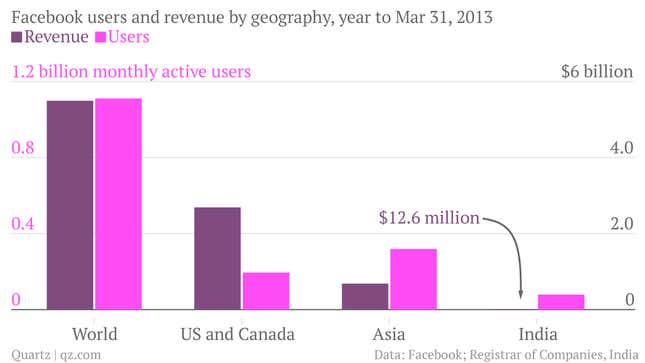In the year ending March 31, 2013, Facebook made $5.49 billion in global revenue. Nearly half of that came from the United States and Canada, which the company counts together. But the second-largest pool of Facebook users, in India, contributed just 756.4 million rupees, or $12.57 million—less than one quarter of one percent of the total.
This week, Facebook’s operations head, Sheryl Sandberg, is in India to try to change that equation. According to reports in the Indian press, she is scheduled to meet members of the press, owners of small and medium businesses, government officials, and the new prime minister, Narendra Modi.
India is high on everybody’s list of priorities right now. Last week, Google signaled its seriousness about India with a way for makers of cheap smartphones to offer better products—and give Google greater control over its mobile operating system in what is becoming the world’s second-largest phone market. As we wrote then, it is no surprise that Google launched the project in India: With its huge, young population and low smartphone penetration, India is the single most attractive market for phone companies today. Apple is trying a variety of offers and discounts to drive iPhone sales in India. Amazon and eBay are pouring millions into the market.
Yet for all the investment and optimism, returns so far have been weak. Facebook’s revenue has historically been disproportionately reliant on the US. In the year to March of 2013, the latest for which India-specific numbers are available from the Ministry of Corporate Affairs’ registrar of companies, about an eighth of Facebook’s revenue came from Asia, even though it was home to just under a third (pdf) of Facebook’s 1.11 billion users at the time. India accounted for 78 million, or 7%, of those users at the end of March 2013.

Few other foreign tech firms fare better. Over the same year, LinkedIn reported profit (not revenue) of Rs 47 million, $782,000 in today’s dollars. By way of comparison, LinkedIn’s global profit before interest, taxes, depreciation and amortization for the first quarter of 2013 alone was $83.3 million (pdf). Google managed a more respectable Rs 20.77 billion in Indian revenue—$331 million at the time—according to the Business Standard newspaper. But that was still only 0.6% of its 53.5 billion global revenue over the year.
These numbers do not paint the whole picture; parsing the accounts for these companies’ unlisted foreign subsidiaries can be tricky. For example, tech firms can (and do) legally claim to make next to no money in the United Kingdom because billing is generally handled by their Dublin offices in order to benefit from Ireland’s favorable tax rates. Such financial engineering is easier in the European Union thanks to the principle of the free movement of goods and services across national borders. But that doesn’t stop companies from trying it elsewhere too. Indeed, Nokia has been fighting a long-running battle in India over non-payment of taxes for downloads on phones.
Still, $12 million in revenue from a country that had 78 million Facebook users (16 cents per user, compared with just under $14 per user in the US for the same period) is nothing to write home about—except to ask for reinforcements. That explains what Sandberg is doing in Hyderabad and Delhi this week, and particularly why her agenda is said to include meetings with small businesses, traditionally Facebook’s biggest advertisers. According to the Economic Times, another Indian newspaper, 900,000 small businesses in India already have a presence on the platform. ”Facebook is the communication to grow economies and we are pretty important in growing small businesses,” the paper quotes her saying, adding that Facebook is the “most potent answer to the needs of SMBs. [small and medium businesses].”
What she forgot to mention is that those SMBs in India are also the most potent answer to the needs of Facebook.
